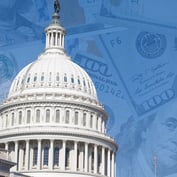If Congress keeps the current laws in place, many employers that sponsor defined benefit pension plans will have to make big contributions to the plans April 1.
The American Benefits Council, Washington, a group that represents large employers, helped organize a press conference today to make the case that temporarily relaxing funding rules could save jobs without seriously harming pension plans’ finances.
Rep. Pat Tiberi, R-Ohio, participated in the call. Tiberi is a sponsor of H.R. 3936, a bill introduced by Rep. Earl Pomeroy, D-N.D., that would temporarily ease the plan funding requirements.
Under current rules, employers must certify their funding status April 1 and make quarterly contributions based on funding status figures April 15, according to the American Benefits Council.
The 2008 investment market meltdown and the low rates now paid on government bonds have hit plan funding levels hard. Mark Warshawsky testified in September 2009 at a House Ways and Means Committee hearing on pension funding rules that the average 2008 regulatory funded status was 96% and that employers had to make about $40 billion in funding payments.








 March 24, 2010 at 08:00 PM
March 24, 2010 at 08:00 PM









